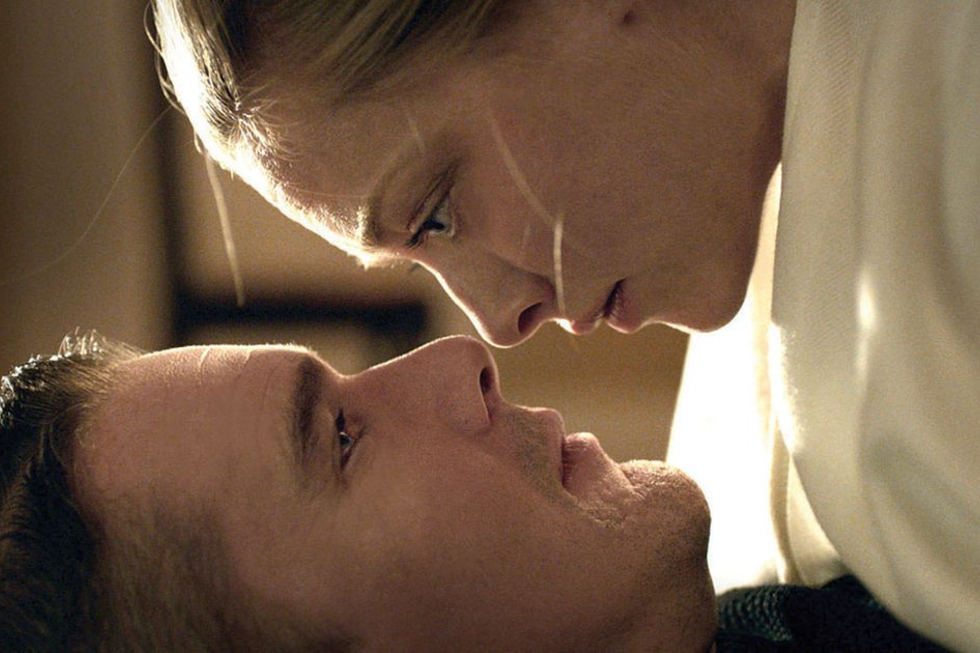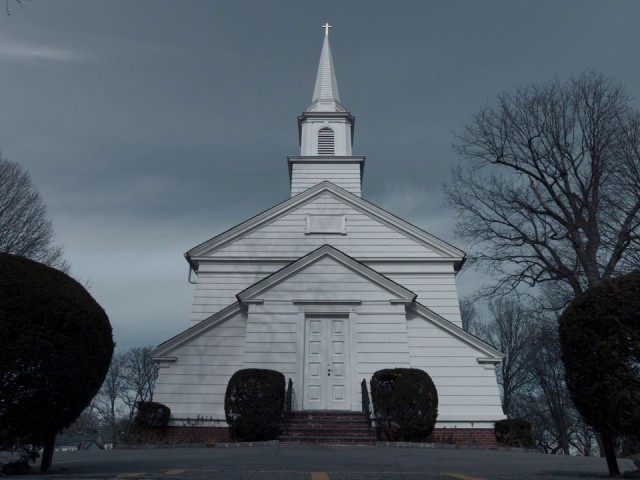Despair, Hope and ‘Doomscrolling’ in Paul Schrader’s First Reformed

“Someone has to do something.” Luke Penny on the eerie parallels in Paul Schrader’s 2017 film, First Reformed, with our compulsive doomscrolling of social media…
We’re six months into a global pandemic and I’m thinking about Reverend Ernst Toller again. Engrossed in rolling news coverage, press briefings and an ever-updating Twitter timeline, Toller – Paul Schrader’s would-be martyr from his 2017 film First Reformed – feels eerily representative of a very modern ailment. If recent months have revealed anything, it’s how easy it can be for devastation on a global, macro scale, to reverberate in our personal lives.
Many of us have even begun ‘doomscrolling’, a neologism expressing the compulsion to trawl page after page of bleak news and worsening statistics amid a crisis, if only to feel useful. Though this might answer our immediate need to stay informed and look out for our loved ones, what it also does is worsen our anxieties and damage our ability to detach from the gloom in order to live our lives.
Mask safety, the inherent risks of the virus, the struggle against police brutality and the frenzied online racism it has reignited – these things keep us up at night. Low, droning background noise while reading and re-reading the same line in a book, vacantly washing dishes, or answering emails. It grips us tightly until malaise sets in. How might we meaningfully respond to something so clearly beyond our control?
First Reformed finds Toller (Ethan Hawke) plagued by this very question. When we first meet him – an alcoholic ex-army chaplain and pastor of the antiquated First Reformed church – he is already toiling through a year-long diary about his faith, indiscretions unknown and the need to write it all down. It also emerges that he’s suffering alone with a form of cancer, having separated from his wife sometime after the death of their son in Iraq.

Meanwhile, pregnant parishioner Mary (Amanda Seyfried), one of his few remaining congregants, urges Toller to counsel her spiralling environmental activist husband out of his despair at bringing new life into the world, leading to a confrontation that spurs Toller to take potentially catastrophic action. Though the film’s looming threat is unquestionably climate change (and our subsequent inaction), it’s not about that. Not really. First Reformed, like many of Schrader’s films, is about decay – both social and personal, and the existential horror that comes with trying to keep a lid on it.
For starters, there’s the sustained and overwhelming sense that previously trustworthy institutions can not only no longer help, but may even hinder our attempts to handle the crisis; such hypocrisies only become more apparent as Toller sinks deeper into despair. The garishly commercial megachurch Abundant Life, for example, with its key financier a polluting industrialist, is also, crucially, the only lifeline for Toller’s quaint parish to survive beyond its 250th anniversary celebrations. In Schrader’s world, as in ours, organised faith has seeded ground to capitalism just to survive and grown all the more ugly for it; its sterile monochrome cafeteria underlining the film’s depiction of a church bumping up against modern conditions.
Schrader masterfully draws us into the spiral. He plays with sound, thrumming with wrongness as Toller, alone and bathed in the blue glare of a laptop screen, trawls its disturbing contents and endless printed pages over a diminishing glass of whiskey. If Hawke’s nihilistic narration prior to this sequence wasn’t enough, the filmmaking confirms he’s in deep: “I know that nothing can change, and I know there is no hope.” When the soundtrack isn’t performing haunted vibrations, it’s absent, drowning out all other diegetic audio from a scene except Hawke’s voice-over.
When undermined or simply ignored, we retreat inside Toller’s head, not just encouraged to identify with his desperation but privy to the thoughts he dare not give voice to. Compounding this is the film’s ‘Academy ratio’ – a 4:3 box eschewing typical widescreen – and frequent full-body long shots, formalising the character’s distress. A doll’s house view on events set in increasingly confined spaces, trapping Toller inside.
What Schrader’s films have often done is zero in on the obsessive compulsions that allow us to exercise what we believe to be control over our despair, both real and imagined. In his biographical film Mishima: A Life in Four Chapters, Schrader depicts a different kind of martyr, the Japanese writer and fierce nationalist Yukio Mishima, focusing on his pursuit of total physical and artistic perfection over a life which culminates in his own death by ritual suicide.
Taxi Driver’s Travis Bickle, probably Schrader’s most enduring creation, hones his body and marksmanship in front of a dirty mirror, responding in part to the setting rot of 70s New York as the city edged towards bankruptcy. Hardcore, another of the director’s everyman vigilante films, sees George C. Scott wage a one-man war on the underground snuff film industry in search of his missing daughter. These films – with their inevitably scattered, violent outbursts railing against the rising existential threat – articulate the feeling that something is rotten at the core of society, while otherwise ordinary people are left to pick up the pieces.

In a post-9/11 world, Ernst Toller doesn’t pick up a gun or a sword. He straps on a suicide vest under his robes, intending to kill himself and potentially the entire congregation, including wealthy donors and – Toller is shaken to notice – Mary. For all of First Reformed’s bleakness, it’s the relationship between Toller and Mary that grants levity, as well as a final note that suggests another way forward. These characters have a connection that amounts to more than faith. Their shared (but crucially non-sexual) intimacy on the floor of the parsonage is a trippy and welcome break with reality, but the finale is different. It’s a decision.
Ready to end his own life rather than inadvertently harm Mary and their relationship for good, Toller reaches for a glass and a bottle of bleach. “Ernst” she calls, interrupting him and the toxic mixture before he drops the glass, meets her across the room and embraces Mary in a dreamlike, 360-degree tracking shot, complete with angelic vocals underscoring the moment’s passion. For a film that so closely mirrors Schrader’s earlier work, this is one that doesn’t end in violence. In this final moment, Toller appears to turn away from despair and towards Mary, hinting at Schrader’s ultimate response that the film has been building towards.
First Reformed suggests there are no easy answers to alleviate our anxieties. It’s a primal scream of a film, rising out of an era that has now seen two economic recessions, war in the Middle East, the widening gap between rich and poor and now a pandemic, exposing the rot at the heart of our infrastructure. If you were to endorse the evidence the film presents, man-made climate change is here, and its effects are irreversible. We are also, as of writing, staring down the barrel of more time spent inside while politicians scramble to produce similarly half-hearted, capitalistic solutions to the kind that got us here.
If anything has propelled us through this moment, it’s people. Whether over video link or instant message, technology has both cursed and granted us with different but meaningful avenues of connection – even if it is just exchanging fruit with friends on Animal Crossing. Schrader’s characters, like us, have few choices but to find hope and comfort in the connections they have with each other.
Luke Penny
First Reformed is available to watch on digital platforms





